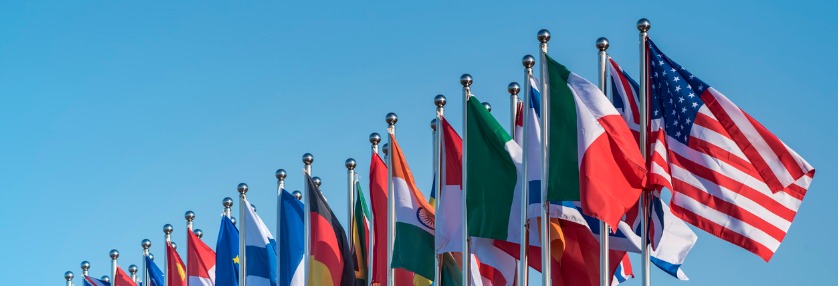- Investing
How might a Biden presidency change relationships with the rest of the world, and what could it mean for investors? asks Josh Pond of Rowan Dartington.

“No nation has friends, only interests,” said Charles de Gaulle.
President-elect Joe Biden has said that the US is “ready to lead the world, not retreat from it”. As he begins appointing the members of his new cabinet, it certainly appears that he is sending a signal to the world that the US wants to re-engage. As the process continues over the next few weeks, foreign leaders are likely to get a better grasp of what a Biden presidency may mean for their own national interests.
Diplomatic relations under Donald Trump were fractured at times, even with allies of the US. A Biden presidency is likely to see the US conducting foreign policy in a more conventional style – but what could this mean for investors?
Europe
Europe struggled to find common ground with the Trump administration. They disagreed about a range of issues including the Paris Agreement on climate change, the Iran nuclear deal, protectionism and trade. European leaders will be hoping to rediscover an ally in the White House once Joe Biden takes his seat in the Oval Office in January.
A draft plan prepared by the European Commission includes an appeal for the two sides to bury the hatchet on persistent transatlantic tensions; but for now, the trade war between the two regions is ongoing, with the EU recently imposing tariffs on US planes and agricultural goods, in response to Donald Trump’s levies on EU exports, including whisk(e)y, wine and cheese. The EU may be hoping for a reset under Joe Biden, but points of disagreement – including Russian gas and the taxation of Big Tech – won’t be going away any time soon.
European markets have been out of favour compared to their tech-heavy American counterparts for much of this year. If we see a warming of relations, export-driven European nations could find a reason for optimism under a Biden presidency. Europe has also been a major critic of the power and influence of Big Tech – something it has in common with Joe Biden – potentially offering some headwinds to the share price of those tech companies that are already under scrutiny for operating as perceived monopolies.
China
China may be expecting more of the same from a Biden presidency. Before the election, it was one of the few areas on which the Democrats and Republicans agreed, believing that more needed to be done to curtail the growing economic influence of China and counter what are perceived in the US as unfair Chinese trading practices. Joe Biden’s approach should be more muted than that of his predecessor – which may reduce the likelihood of markets reacting negatively to surprise tariff announcements.
The phase one trade deal agreed by Trump at the beginning of this year looks dead. It is likely Joe Biden will want to negotiate his own deal, and there have already been positive signals from Beijing that the Chinese are willing to talk. If renegotiations with China are significant and wide-ranging, we could see a major boost to global equity markets. But it’s likely that this will be a slow burner over the course of Biden’s presidency.
UK
A trade deal between the US and the UK failed to materialise under Trump, and a deal under Joe Biden looks less likely. In fact, depending on the outcome of Brexit negotiations, Biden may side with Europe when it comes to any trade deal, given how vocal he has been about protecting the Good Friday Agreement.
Brexit remains a cloud hanging over the UK market, and is, in large part, why the UK is currently so out of favour with investors. However, if an agreement is reached with the EU, and the Biden administration appears open to a trade deal with the UK, prospects for UK equities may improve significantly.
Middle East
Trump alienated key allies as a result of his foreign policy in the Middle East. Biden is expected to take a much more controlled approach, re-engaging with global institutions such as the UN to re-establish alliances rather than going it alone.
Biden has said he will rejoin the 2015 Iran nuclear deal but will have to manage the situation carefully at home and abroad. Support for the Iran deal is partisan in the US, with Democrats supporting sanctions and Republicans largely opposing. The Senate run-offs in Georgia in January will determine the Biden administration’s ability to act decisively on Iran on the international stage.
Ahead of Biden’s inauguration in January, investors can expect to see the status quo ante in international relations, particularly in the case of traditional allies such as the UK and Europe; while China will continue to be a focus for markets. But with a new president moving into 1600 Pennsylvania Avenue, countries around the world will be looking to capitalise on a more constructive trade relationship.
However, nothing is certain. For investors, a balanced approach to asset allocation will remain the best way for investors to take advantage of opportunities as Joe Biden’s first presidential term takes shape. A St. James's Place Partner can help with this, just ask.
The value of an investment with St. James's Place will be directly linked to the performance of the funds you select and the value can therefore go down as well as up. You may get back less than you invested.
Rowan Dartington is the in-house provider of St. James’s Place discretionary and stockbroking services.
The opinions expressed are subject to market or economic changes. This material is not a recommendation, or intended to be relied upon as a forecast, research or advice.
Some of the products and investment structures documented within this article will not be available to our clients in Asia. For information on the funds that are available please get in touch.
Most recent articles


